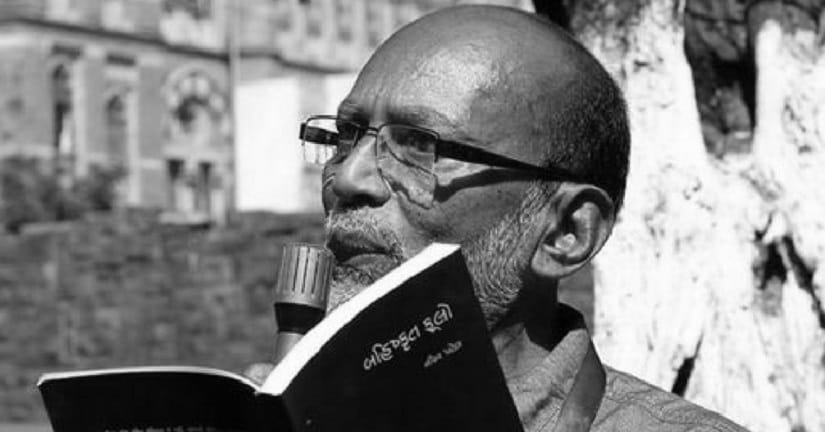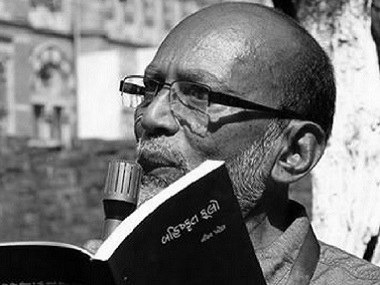Last October, I was invited by Ahmedabad’s Conflictorium Museum to deliver a talk on ‘Dalit poetry, translation and transition’. The lecture had been planned for 14 October, on which day in 1956, Dr Babasaheb Ambedkar had embraced Buddhism with his followers. It was in the 6.30 in the evening, and as the time for the talk drew nearer, the room began to fill up with audience members who included noted translators, professors, poets, scholars, as well as students, activists, artists etc. I knew none of them. Initially nervous, the audience’s attentiveness soon encouraged me to speak with fever nerves. After the talk, the audience posed several questions. Only one was written on a small piece of paper and handed to me (instead of being conveyed verbally). The note was in English, the letters inscribed in an attractive, lucid hand. It was from a man named Neerav Patel. I answered his question, then wondered if I had articulated my response sufficiently well; Patel smiled and nodded. He wrote another note: The doctor advised me not to talk. He smiled again. On that first and last meeting (I did not know then it would be my only meeting with Patel), he gifted me his collection of poetry, Severed Tongue Speaks Out. He had translated it from Gujarati to English himself. [caption id=“attachment_6670771” align=“alignnone” width=“825”]  Neerav Patel[/caption] In April 2019, I visited Ahmedabad once again: I had co-curated a 15-day-long sound-exhibition about Ambedkari shahirs — ‘their songs, life and time’ at the Conflictorium. I phoned Neerav bhai to invite him for the show’s inauguration of the show. He informed me he wouldn’t be able to make it, as he was bedridden. I told him I would come see him after the show. I did not go. On 15 May, Neerav Patel passed away after being ill with cancer. Read Neerav Patel’s poetry: Inequity of inequality — A lament in Gujarati Neerav Patel was born into a Chamar (tanner) family in 1950, in the village of Bhuvaldi (Ahmedabad district, Gujarat). He was perhaps the first Dalit poet to write poetry in English. Earning his BA, MA and PhD in English Literature, Patel was a bilingual poet, elucidating his keen sense of poetic undercurrents within the lives of Dalits through his verses, both in English and Gujarati. A voracious reader and distinguished editor, Patel was also one of the pioneers of Dalit literature from Gujarat. He was associated with the Dalit movement in Gujarat from its beginning and committed to it with the only weapon at his disposal — his words. In an interview with Jaydeep Sarangi, Patel once said: “I have suffered my share of humiliations and indignities, discrimination and segregation but have saved myself from physical violence so far. I have, however, witnessed cruelties meted out to my innocent kith and kin and other known and unknown Dalits. In this social scenario, what more motivation one requires to join a Dalit movement? (There’s) no choice but to join the movement that fights for survival and humanhood. I joined the movement with the tools and weapons I have: I have words that can appeal for change to a just social order, I have words that can attack for change in (the) social system, to make it an egalitarian social system. I have joined the Dalit movement as a committed Dalit poet, as a missionary Dalit writer.” It was with this clarity and understanding of his role in the world of literature, that he also wrote his verses — some of which were widely celebrated — and helped humanise the otherwise prejudiced and brutal imagination of readers of literature in India. Even as the Dalit Panthers had their most impactful years in Gujarat, in 1978 Patel became one of the founding members Aakrosh — the first ever magazine by Dalits that was dedicated to Dalit literature. The magazine’s contribution to the rise of Dalit writers in Gujarat cannot be underestimated. Patel also published several poetry collections, including Burning From Both The Ends (1980, English poems), What Did I Do To Be Black and Blue (1987, English poems) and Bahishkrut Phulo (2006, Gujarati), with the most recent being Severed Tongue Speaks Out (2013). Perhaps the first Dalit poet writing in English, the centre of Patel’s poems had always been the life of his people, his community; his verses helped establish non-Brahmanical aesthetics and literary narratives in Gujarat. Even though Patel worked as a bank officer, his literary career was prolific. He edited several influential and important literary magazines including Kalo Sooraj, Sarvanaam, Swamaan, Aahwaan, and Vaachaa. Unfortunately, these magazines are mostly defunct today. The literary and historical significance of his verses led to the translation of his poems into many Indian and foreign languages. Recalling Patel’s contributions, Dr Ganpat Vankar, noted translator of Gujarati literature, says, “Gujarati Dalit literature has lost its pioneer. Contrary to his name Neerav (meaning ‘the silent’), he always raised his powerful, poetic voice against injustice and discrimination based on caste, gender, and religion. Although his poems are few in number, their impact is immeasurable.” Those who have read Neerav Patel already understand the loss the literary world has sustained with his demise. For those who have never read him, the poem below — translated by Patel himself — will drive home what India lost when his voice fell silent. Jai Bhim, Neerav bhai. Ostracised flowers if that’s the order, we bow our heads in obedience: we will call flowers by any other name, will their fragrance die? and will call these denizens flowers, will their stench go? the old saying may turn only subtler: where there is a village, there is a phoolwado, a colony of flowers. these flowers remained shut and shrunk in dark centuries. if they got full moon night by chance, they bloomed like lilies. sometimes spread fragrance like ratrani buds, sometimes would sob silently like the flower of nargis. no sooner did the benign sun of this century begin to shine upon them but than they began blooming and blushing: with such colours, that even butterflies would fall in love with them. with such fragrance, that even honey bees would forget to sting them. everywhere roams the fragrance of these rustic flowers: in parliament, secretariat, schools and colleges ! as if their eerie exhalation has engulfed the entire environment. that where there is a village, there is a phoolwado, a colony of flowers, we know and we respect our forefathers’ wisdom. but we can no longer tolerate this temerity and tamasha of these flowers. let them enjoy loitering in the President’s Moghul garden. but no, they cannot enter the holy precincts of Nathdwara. let Gandhi put them on his head as pious flowers, if he so wishes. ah, trample them, crush them, these untouchable, filthy flowers. but how will we offer pooja without flowers? how will we decorate the swings of Lord’s manorath? how will we pacify our gluttonous goddess, the big belly? with the blooming labours of these flowers, aromatic become our latrine-like lives. these are the heavenly flowers, the parijats of our planet. that’s why we shall have to nurture every colony of these flowers in every village, and every city as we nourish silkworms on the shetur plants. if the government maibaap orders, we kneel down before you : we will call flowers by any other name. will the fragrance die? and we will call these Dalits denizens flowers instead. will the stench go?
Perhaps the first Dalit poet writing in English, at the centre of Neerav Patel’s poems was always the life of his people, his community, and his verses helped establish non-Brahmanical aesthetics and literary narratives in Gujarat.
Advertisement
End of Article


)
)
)
)
)
)
)
)
)



